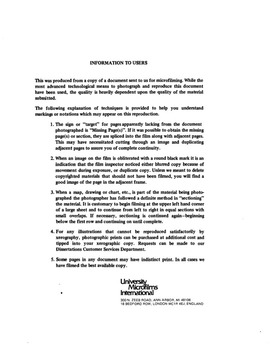| dc.contributor.author | Becker, Fred W., | en_US |
| dc.date.accessioned | 2013-08-16T12:28:20Z | |
| dc.date.available | 2013-08-16T12:28:20Z | |
| dc.date.issued | 1981 | en_US |
| dc.identifier.uri | https://hdl.handle.net/11244/4847 | |
| dc.description.abstract | Results of the analysis indicate that not-for-profit organizations suffer competitive disadvantages because of low levels of awareness, willingness, or ability. Statistical tests indicate that these competitive disadvantages are most likely to be observed in the "best-and-final" stage of the competition. | en_US |
| dc.description.abstract | Thus, even though the relative amounts within categories of nonexclusionary procurement methods awarded to for-profit and not-for-profit organizations will continue to be a function of behavioral and economic factors, political decisions will establish the parameters by which these behavioral and economic factors will affect the distribution of awards. The conclusion is that these political decisions discriminate against not-for-profit organizations in being eligible to participate in the procurement process and will continue to do so in the future in the absence of radical form. | en_US |
| dc.description.abstract | In addition to suffering competitive disadvantages when competition actually occurs, not-for-profit organizations are increasingly being excluded from the competitive process. The combined influence of small business set-asides and other exclusionary procurement methods for small business concerns has reduced the degree of competition substantially in the recent past between for-profit and not-for-profit organizations and will do so even more in the future. Taken to its extreme, this policy will have the effect of reducing not-for-profit participation in the procurement process to negligible proportions. | en_US |
| dc.description.abstract | This study is an analysis of factors affecting the distribution of contract (i.e., procurement) awards for "external analysis and management services"--management analysis, economic analysis, policy analysis, social research, management support, and the design, operation, and evaluation of social programs. The primary interests are: (1) the distribution of awards between for-profit and not-for-profit organizations, and (2) the impact upon this distribution of policies adopted by the Congress or the bureaucracy which have the effect of reducing the ability of one organizational type vis-a-vis another to compete effectively. The analysis utilizes data from a sample of contracts awarded by the U.S. Department of Housing and Urban Development (HUD) that indicate characteristics of the recipient organization, and to a lesser extent, characteristics of all organizations competing for awards. | en_US |
| dc.format.extent | x, 227 leaves : | en_US |
| dc.subject | Political Science, Public Administration. | en_US |
| dc.title | Factors affecting the distribution of procurement awards for external analysis and management services. | en_US |
| dc.type | Thesis | en_US |
| dc.thesis.degree | Ph.D. | en_US |
| dc.thesis.degreeDiscipline | Department of Political Science | en_US |
| dc.note | Source: Dissertation Abstracts International, Volume: 42-02, Section: A, page: 0845. | en_US |
| ou.identifier | (UMI)AAI8116591 | en_US |
| ou.group | College of Arts and Sciences::Department of Political Science | |
